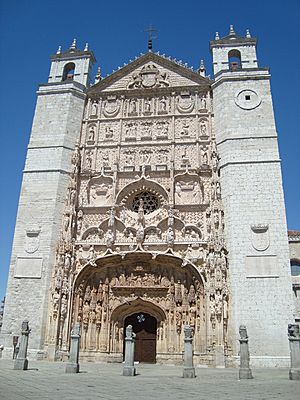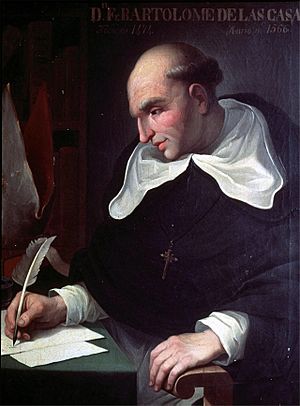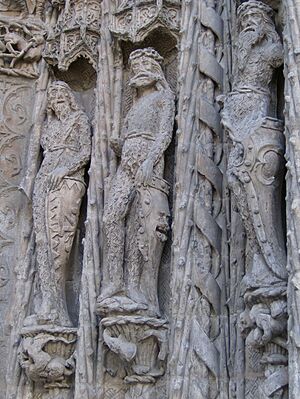Valladolid debate facts for kids

The Valladolid debate was a very important discussion that happened in Spain between 1550 and 1551. It was the first time in European history that people seriously talked about the rights and fair treatment of native people by European countries. This debate took place in the Colegio de San Gregorio in the city of Valladolid, Spain.
The main topic was whether it was right to conquer the Americas. They also discussed if it was okay to force native people to become Catholic. Most importantly, they talked about how European settlers should treat the native people of the New World. Different people had different ideas about how native people should fit into Spanish society, become Catholic, and what rights they should have.
One important person in the debate was Bartolomé de las Casas. He was a Dominican friar (a type of priest) and a bishop. He argued that native Americans were free people, even if they practiced things like human sacrifice. He believed they deserved the same respect as the European settlers.
On the other side was Juan Ginés de Sepúlveda, a smart scholar and priest. He argued that practices like human sacrifice were wrong and "crimes against nature." He believed these practices should be stopped, even if it meant going to war.
Both sides said they won the debate, but there's no clear record to say who truly did. This event is seen as one of the first times people debated colonialism (when one country takes control of another). It also brought up important ideas about the human rights of people who were colonized and how countries should act towards each other. In Spain, the debate made Las Casas famous as a strong defender of the native people. He and others helped create the New Laws in 1542. These laws tried to limit the encomienda system, which was a harsh system of forced labor. Even though the laws didn't fix everything, they greatly improved how native people were treated and protected their rights.
Why the Debate Happened

Spain's conquest of the Americas led to many discussions. One big question was whether it was right to force native people to become Christian. Bartolomé de las Casas, a Dominican priest, worked for many years to stop forced conversions. He also tried to show how badly native people were treated in the encomiendas. These were systems where Spanish settlers forced native people to work for them.
Las Casas's efforts helped the Pope issue an important statement called Sublimis Deus in 1537. This statement said that native people were rational human beings. Even more importantly, Las Casas played a key role in getting the New Laws (also called the Laws of the Indies) passed in 1542. These laws were made to end the encomienda system.
Because of Las Casas and others, King of Spain Charles I ordered a stop to further military expansion in 1550. He wanted to investigate the issue first. The King brought together a group of important doctors and religious thinkers, called a Junta. They were there to listen to both sides and make a decision. Las Casas presented one side of the argument. The King's government supported his view because they wanted to control the powerful encomenderos (the settlers who ran the encomienda system). Juan Ginés de Sepúlveda represented the other side. His arguments were used by colonists and landowners who benefited from the encomienda system.
Images for kids
See also
 In Spanish: Junta de Valladolid para niños
In Spanish: Junta de Valladolid para niños
- Catholic Church and the Age of Discovery
- Sublimis Deus
 | Delilah Pierce |
 | Gordon Parks |
 | Augusta Savage |
 | Charles Ethan Porter |



